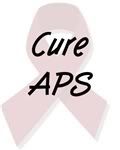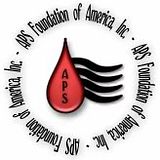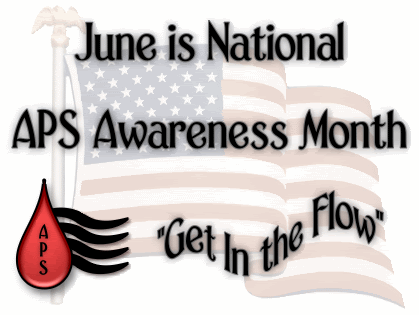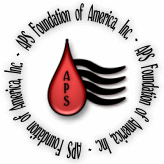"Breaking the Barriers: Blood Clots - Now What?"
This is my post on how the seminar went. it will probably be long, so please bear with me.
First let me say that if you have an opportunity to attend something like this, PLEASE try to make it there!! It was very good, informative and really a chance to get to ask some questions you may have to specialists. And, you will meet others with similar problems in your area, and how comforting is it to know that you are not alone??
Todd and I had about an hour and a half drive to get to Lansing and of course, we got up late...that is just us. But we got there in record time thanks to Todd's lead foot that he pulls out in times of emergency lol
When we got there, we had about 15 or so minutes to set up the table (APSFA was able to get a table...I think Lovenox was supposed to come and backed out...which was great for us to get out there like that!!) Then the seminar started.
First was an introduction from a Dr. John Penner who is a Professor for the MSU Department of Medicine as well as the Director of the Adult MSU Center for Bleeding and Clotting disorders. He also sees patients and I will be adding him to our dr list this weekend if he's not already there. He was very good from what I heard. He breifly explained clotting and introduced the seminar.
The next speaker was Dr. Roshni Kulkarni and she is the Director of the Division of Blood Disorders for the CDC as well as a Professor at the MSU Department of Pediatrics. Her part was titled "What are blood clots? Why and how do they form?" She had some excellent slides with animations on how the blood clots form and what happens with the different clotting disorders, such as APS and Factor V Leiden. Very interesting, and I learned alot from her presentation. She also said she worked for the Red Cross...not that that matters, but I wrote it down to tell Tina lol
Next up was Dr. Stephan Moll who is the Director of the University of North Carolina Thrombophilia Department as well as the Chair of the Medical and Scentific Advisory Board for NATT. He spoke twice, once before the break and once after. The first time he spoke it was supposed to be "Who is at risk for inherited and acquired clotting disorders" However it was really about Blood clots in general and how to prevent them and treatment. He was a very good speaker. Very personable and got the audience involved. He also added some humor in his slides, which was good because it was a long day.
Dr. Moll had added Todd into his "Lecture" as well. We had been in contact with him before hand and I sent him a picture as well as Todd full story...and I was impressed later on to find out that he actually read the whole thing because he spoke about a few different things that were on there (Todd's PFO, his TIA's, DVT, and Sticky Platelet Syndrome) He also mentioned APSFA a couple of times, and the FVL page a lot!! But he is the med advisory for the FVL page...so understandable.
I think Dr. Moll was the best speaker they had, hands down.
OK, then we had a Q&A time and a break. There were alot of interesting questions asked, none about APS specifically. and Dr. Moll answered most of them.
Next was a very inspirational personal story from a woman named Susan Mohr who is from Michigan, has FVL and had two DVT's...one in each arm. She ate right, was healthy, exercised, etc...and now she can barely do anything because of the risk of her forming another clot in her arms. She really broke down what it's like to have gone from a healthy indivudual to having a clot, and I plan on trying to get in touch with her and tell her that her speech really opened my eyes. They video taped the entire seminar and will eventually put it on a website...when they do, I will share it with you all, and her segment is a MUST see, esp for family members and caregivers. I had tears in my eyes. It was excellent.
The Role of Genetics was next. The speaker was Dr. Ajovi Scott-Emaukpor who is a Professor for the MSU Dept of Pediatrics as well and the Director of the Pediatric MSU Center for Bleeding and Clotting Disorders. His part mostly talked about the inherited clotting disorders, so it was mostly on Factor V Leiden. If Todd had FVL then I may have payed more attention, but the technical stuff really bored me...sorry to say. And he seemed to have not seen his slides prior to talking, he had to pause and read each one. I did notice that.
Dr. Moll's second lecture was next and he spoke about more treatment, who is at risk, and women's health issues. Again, it was mostly about FVL. But he did speak about some about nattokinase (which he does NOT approve of!!) and also the different birth control options and the risks.
Next was the most boring part of the lecture. Not because of the topic...it was running long, and it was lunch time and the woman had a delayed kind of speak that was just monotone and frankly hard to sit through. I am probably being too critical, but I was sitting there starving and was like, ok lady...speed it up. She was Dr. Renuka Gera, a professor for the MSU Department of Pediatrics and also the Associate Chair for Pediatrics. She spoke on Kids and Blood Clots. Some of it was interesting, and I will post another post with my notes in bullets and also some other things and pictures, but for the most part it was a snooze fest for me...but, I don't have kids and supposedly APS isn't "inherited".
Lunch was next and since Todd and I were basically "staff" we got to sit at the reserved table with the people who organized the event. They were both very nice, and we spoke about how we started the foundation and how todd was diagnosed and some other things about the seminar. About half way into our lunch, a woman from ProTime came to sit with us...very interesting talking to her. She basically said that the INR machines DO NOT work for APS patients, and that her company tells peple that and they choose to get them anyways and rish their lives...DUMB!!! Then she said she has family members calling her and saying, you knew this machine didn't work for this disease and you sold it to them anyway!! Well, the patient was well aware at the time of purchase, and in some cases the family members were calling because the family member had died. Scary stuff folks. Just say no to those machines! And this is straight from the representative's mouth!
After lunch we had some time to speak with some people who were visiting the tables. The only tables there were us, Probst compression stockings, Protime and there was NATT, Coumadin, Lovenox and ClotCare info all on one table. We gave out alot of brochures, booklets, newsletters and got a few people to sign up for our email list.
After the break was another Q&A session...more good questions, none APS related. Todd spoke up about people taking their medical information with them while traveling. They were really pushing for the patients to be pro-active in their care, and demand better care. If you don't feel they are doing enough, speak up!! Which is what the APSFA believes in as well!
The next speaker was Karen Boyd who helped to put the seminar on and she is from the MSU Center for Bleeding and Clotting Disorders. She is a social worker, and her speech was wonderful! All about patients and how they are treated, and how a good doctor who honestly takes the time to care and treat the patient makes all the difference. She was another one who when they put it online, it's a must see, IMO anyways. She had an Acronynm (?) for SPEAK UP and I am going to try to contact her to get what that was so I can post it. It was really good, but I didn't write it down.
The final speaker was Kathy Reed from NATT. She had a good talk about how she is a patient with FVL, and also a mother of a daughter with FVL. She also shared some inspirational quotes and spoke about NATT.
And then there were final Q&A and it was done. Afterwards, people were able to go up and have one on one time with the doctors and speakers. So while I packed up our table and spoke with the organizers a bit, Todd waited to talk to Dr. Moll and Kathy Reed.
And then we left...and headed for home!
It was a LONG day...but very very educational! I learned alot that I didn't know. And some stuff that I already did know, but that's ok too!
Ok, if you hung on this long, thanks...the next post will have bullets of my notes and pictures!
Here are my notes...
- Thrombosis is the most major medical problem in the USA.
- There are 1 million cases of DVT or PE per year in the USA.
- Thrombosis occurs in 1-3 of ever 1000 people.
- Factor V Leiden is the most common inherited blood disorder, 1/4 of all people who have had a blood clot carry the FVL gene.
- Thrombophilia = Thrombo (to form a clot) & Philia (love/affection/obsession) So Thrombophilia is love to form a clot.
- Sticky Platelet Syndrome was found in Michigan and most people dx with it are in MI or TX because the student or partner of the person who found it now lives in TX. lol
- There are no clinical studies for SPS.
- The woman from the CDC said that Senators listen to patients. and that we should contact our senators.
- In children, 50% of all clotting disorders are genetic
- APS is an aquired clotting disorder
- Nattokinase has no clinical trials, is NOT FDA approved and do NOT count on it working.
- There is a petition to the FDA to ban all 3rd generation (Yasmin, the patch) BC pills because of the clotting risks.
And that was all of my notes.
A few other things...Dr. Moll was great. he really impressed Todd and I, and we must have impressed him because he wants to work with us and the APSFA in a type of collaboration, which will REALLY help to increase our visibility and get us out there. He mentioned us when he was asking people to donate to NATT, which was good. He came up to us right away and shook our hands and said he was glad to meet us and that we should sit up close. Which was so he could point todd out to the audience as he talked about him lol. He also came and found us at lunch to get a picture with us for the NATT newsletter I assume. The picture is below as well as a picture of Todd and our table and Dr. Moll's slides with Todd on there! LOL
I will be adding the pictures to the website soon, they are pretty boring and just of the speakers.
Again, I cannot stress enough that if you are able to attend one of these seminars You should do so! And bring a family member along too!
Now for the pictures:





















